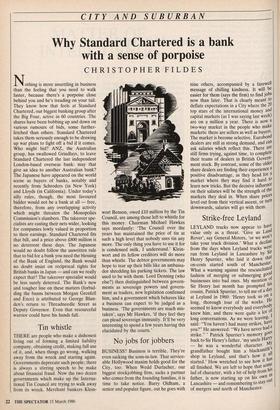CITY AND SUBURBAN
Why Standard Chartered is a bank with a sense of porpoise
CHRISTOPHER FILDES
Nothing is more unsettling in business than the feeling that you need to walk faster, because there's a porpoise close behind you and he's treading on your tail. They know how that feels at Standard Chartered, our biggest banking group after the Big Four, active in 60 countries. The shares have been bobbing up and down on various rumours of bids, some further- fetched than others. Standard Chartered takes them seriously enough to be drawing up war plans to fight off a bid if it comes. Who might bid? ANZ, the Australian group, has swallowed Grindlays, to leave Standard Chartered the last independent London-based overseas bank: may that give an idea to another Australian bank? The Japanese have appeared on the world scene as buyers of banks, notably and recently from Schroders (in New York) and Lloyds (in California). Under today's silly rules, though, the most favoured bidder would not be a bank at all — free, therefore, from any overlapping activity which might threaten the Monopolies Commission's slumbers. The takeover spe- cialists are casting their nets wider, looking for companies lowly valued in proportion to their earnings. Standard Chartered fits that bill, and a price above £800 million is no deterrent these days. The Japanese would no doubt follow the unwritten rule that to bid for a bank you need the blessing of the Bank of England, the Bank would no doubt insist on reciprocal rights for British banks in Japan — and can we really expect that? The takeover specialist would be less surely deterred. The Bank's new and tougher line on these matters (forbid- ding the banns between Morgan Grenfell and Exco) is attributed to George Blun- den's return to Threadneedle Street as Deputy Governor. Even that resourceful warrior could have his hands full.


















































 Previous page
Previous page